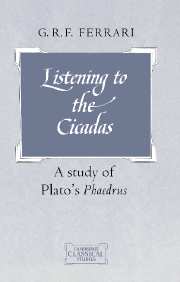5 - Myth and understanding
Published online by Cambridge University Press: 12 March 2010
Summary
Socrates' preamble
The first thing I wish to note about Socrates' mythic hymn is that it does not begin mythically. Rather, Socrates opens with a catalogue of the benefits historically attributed to madness, in order to controvert a premiss on which the nonlover's argument crucially depends: that madness is simply bad (244a5–8). Socrates, by contrast, has now seen that in certain circumstances madness can achieve beneficial results that would be beyond the reach of sobriety. In particular, he will contend that a philosophic life can best bloom when rooted in what he calls the ‘divine’ madness of love, as opposed to a merely ‘mortal’ self-control (256e3–5). It is to support this contention that he will call upon the resources of myth; but first he enumerates three established examples, in domains other than the erotic, of what he means: the prophetic madness of the Delphic Pythia and the priestesses at Dodona, among others, by whose inspired counsel all Hellas has often regulated its decisions for the better (a madness to be contrasted with the sober interpretation of bird-flight and other signs taken as portents of the future) (244a8–d5); the ‘telestic’ madness of those officiants who, we are told, ritually purified great families in the past of their ancestral crimes and ‘diseases’: what we might call ‘faith-healing’ (244d5–245a1); and the poetic madness of those who are seized by the Muses and truly inspired to glorify the deeds of past heroes – as contrasted with the uninspired hack who thinks technique alone will make a poet of him (245a1–8).
- Type
- Chapter
- Information
- Listening to the CicadasA Study of Plato's Phaedrus, pp. 113 - 139Publisher: Cambridge University PressPrint publication year: 1987



